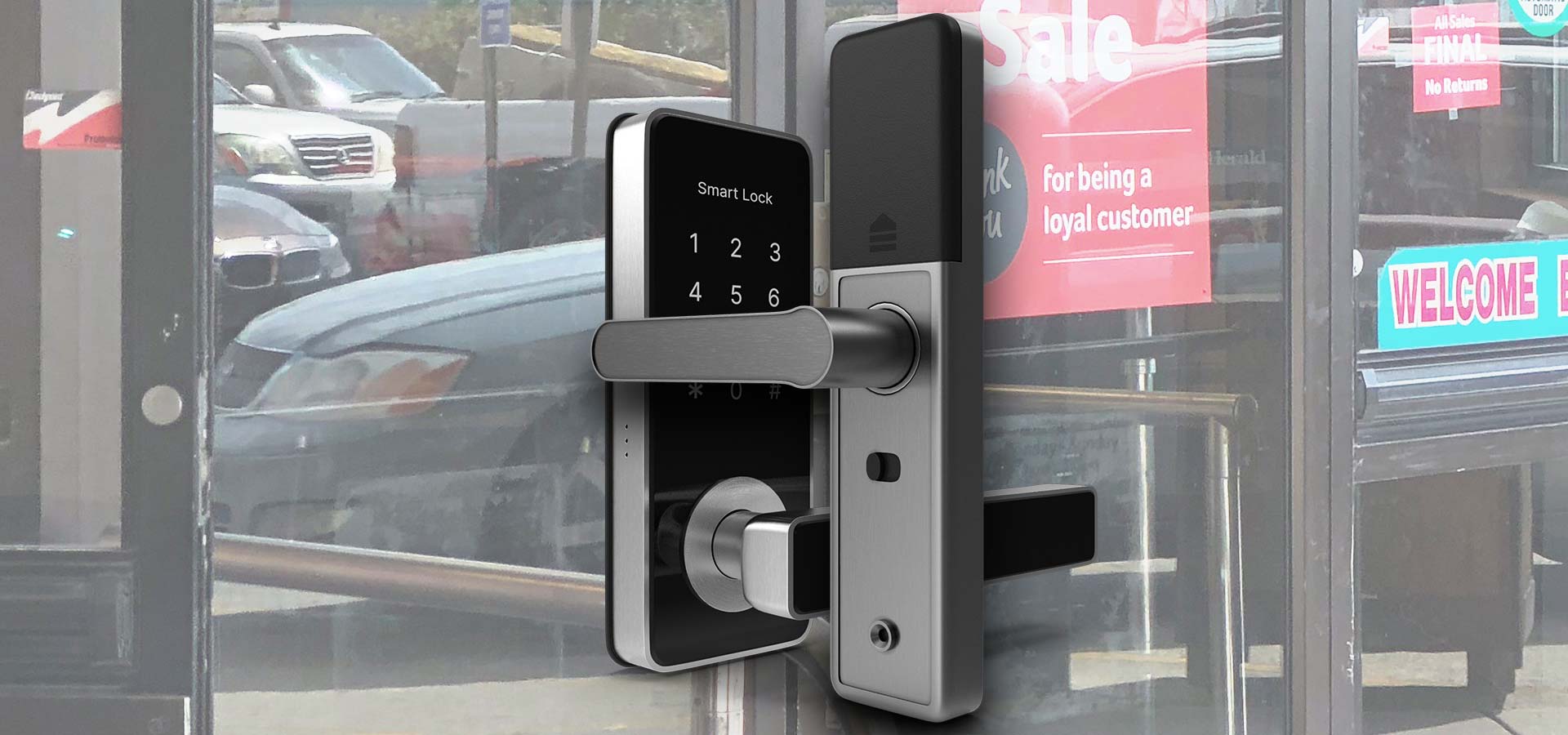Finding your store has been burgled is no fun. The latest grouped statistics are from 2015, and storefront burglary has increased, but some information is still relevant. Of no surprise is that businesses without an alarm system are more likely to be burgled. Most of these involved forcible entries and about half of the burglars entered through unlocked doors.
About 10% of thieves picked locks or used a key to get in, and even back then, mobile security was helping to detect thieves. It’s shoplifting that gets into the news frequently as roving, organized gangs rob stores en masse. But authorities are warning that rising prices and inflation could spur a significant increase in storefront break-ins.
Thwarting criminals isn’t always easy, but the right lock can make all the difference. A residential lock doesn’t offer the same protection, so here’s a guide to the right commercial lock for your storefront door, including some smart locks that offer the ultimate in security.
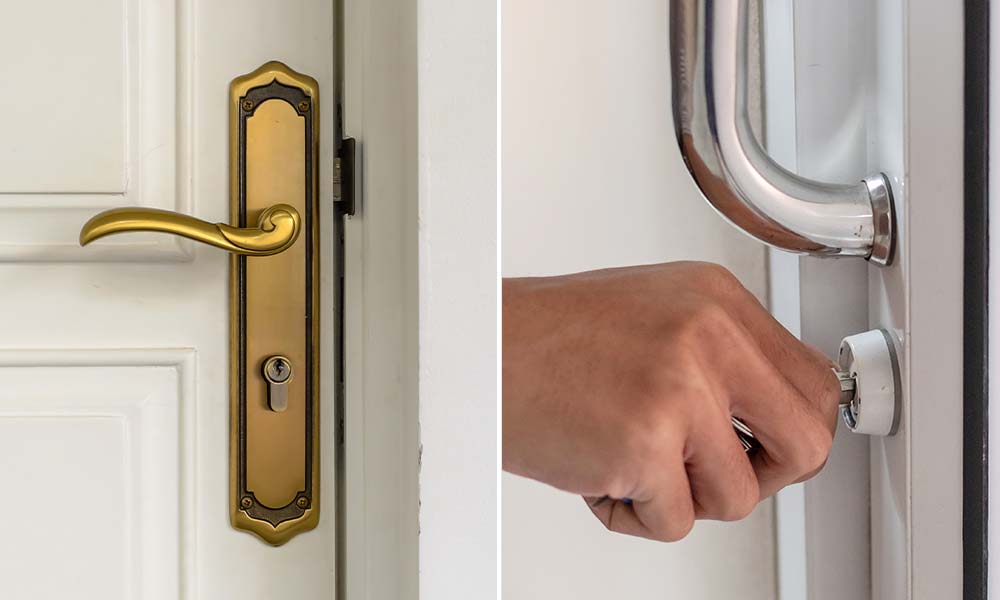
What You Should Look for in Storefront Commercial Door Locks
Commercial door hardware, including locks, is graded by the American National Standards Institute (ANSI), the organization responsible for quality control for door locks for commercial buildings, including storefronts. They offer a directory of certified products that are kept up-to-date, including locks. These locks are tested for strength, longevity, and durability in a number of ways:
Operational testing includes making sure the door latches easily when pulled close, and all grades must have a maximum of 4.5 lbs. force. Retracting the latch by levers is required to have a maximum of 28-inch-pounds.
Cycle testing is done on a test door. The grade one test is run for one million cycles, while grades two and three are run for 800,000 cycles. This determines how many times the lock can be used before wearing it out.
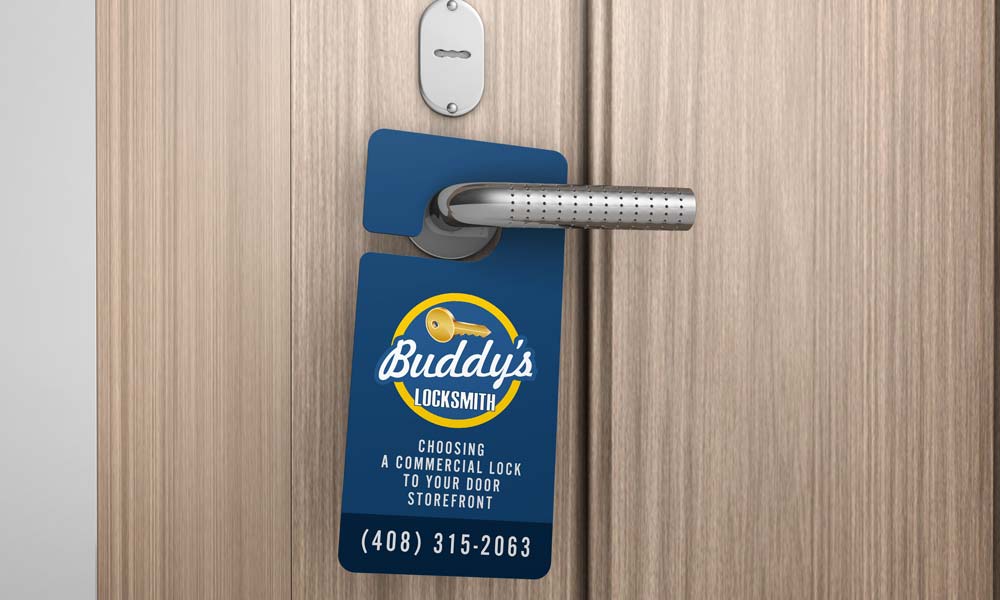
Strength testing is done to ensure that trim, latches, deadbolts, and all lock mechanisms can survive with daily use and meet a minimum of 360 pounds applied to the top of the lever.
Security tests are composed of attacks to gain entry. The lock is struck repeatedly with heavy blows that mimic someone trying to kick down the door.
Material tests evaluate how trim holds up to probing. If the trim is not thick enough, it will get a poor score.
The Three Grades of Commercial Locks
When ANSI tests a commercial grade lock, they give it a grade from one to three, with one being the best. The grading system was created by the Builders Hardware Manufacturers Association, an accredited association of ANSI.
For a commercial door lock to qualify for grading and certification, the lock manufacturer voluntarily submits its products for independent lab testing. This testing determines whether These locks meet the minimum criteria. After testing, the locks are given a grade:
Grade 1: These locks are considered the best of the best, ideal for larger storefronts that get heavy use. These locks are required to have a one-inch latch bolt. This grade is recommended for all storefronts.
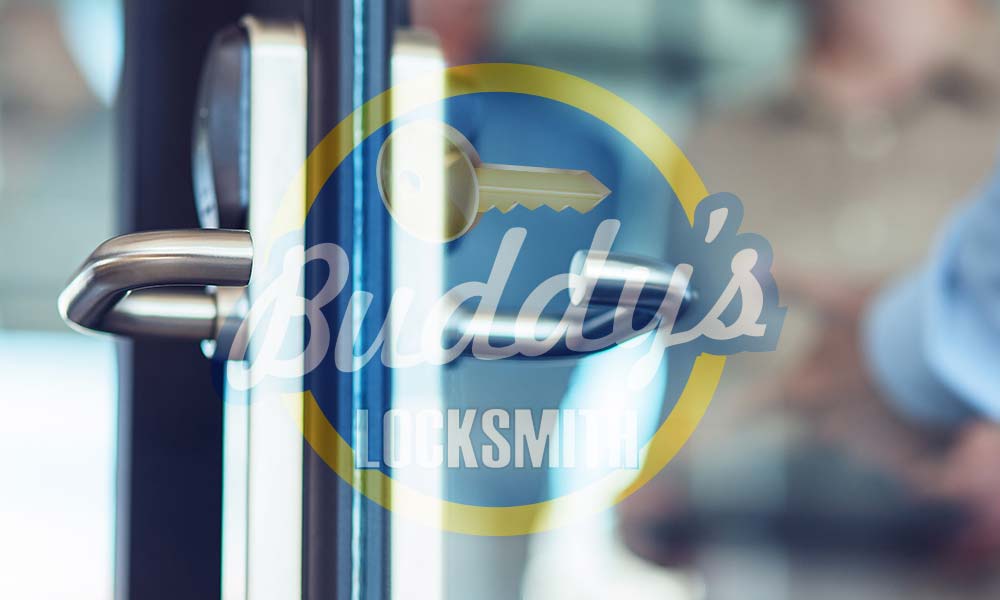
Grade 2: You wouldn’t want this lock on your main entry door, but it’s suitable for locking interior doors. They are considered low-grade for commercial use with a bolt length of ⅝ inch.
Grade 3: These locks are not recommended for storefront main entry points.
You can find the grade of a lock on its packaging. You can also find it on the lock parts. Check the deadbolt, reinforcing plates, the door jamb, or the knob. Then you can check the ANSI directory to see where your lock falls within their grading system. However, your locksmith is the best source of information.
Not only are there different grades of locks, but there are different types of locks.
Common Commercial Door Lock Types
There are five common types of commercial door locks. Let’s take a quick look at each.
Mortise Lock
You’re probably most familiar with these types of locks, which require a pocket in the door (the mortise) to house the body of the lock. This lock has a lock body, a lever or knob, a strike plate to strengthen holes in the doorframe, and a keyed cylinder to lock and unlock. This is one of the most popular options because its strength offers more protection against forced entry. They can be customized by adding deadbolts or accessories such as keypads.
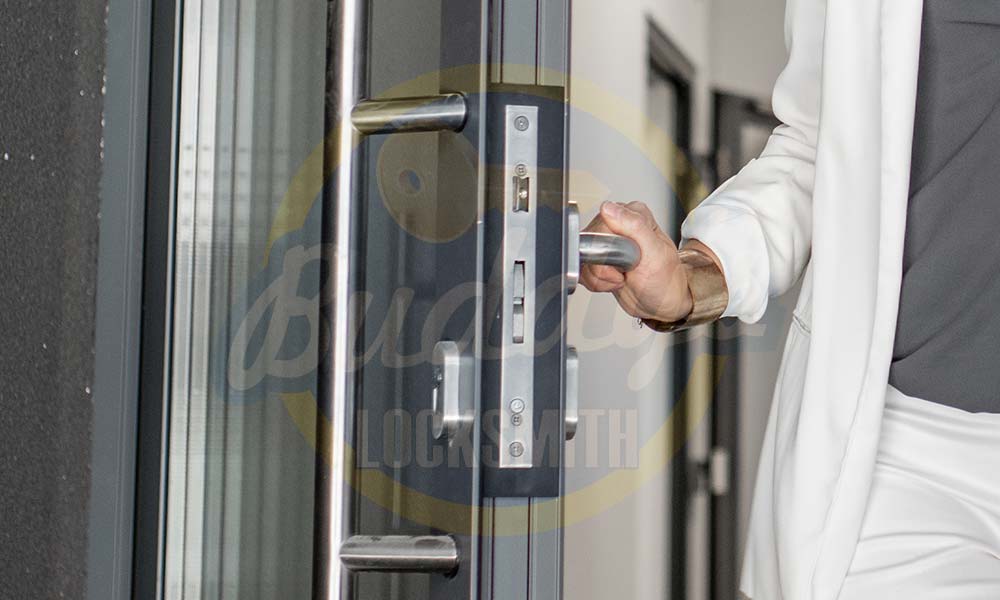
Cylindrical Lever Locks
These are installed through a door and have either a lever or knob as a handle. Two holes are drilled in the door. If you choose this type of lock, be sure to use a lever-style handle so you are compliant with ADA requirements. These locks are good for interior doors, but they are not very secure otherwise, although you can add a deadbolt for added security.
Electric Strike Locks
These locks use a hinged metal latch to keep the door locked. The lock receives an electrical signal and moves the metal plate that unlocks the door. These doors require a keypad, key fob, key card, or a wireless sensor. These types of locks need another device, like a panic bar, so that people inside the building can get out if there’s a power outage. Those seeking entry will have to use a buzzer outside, while an employee uses an internal buzzer to let them in. These locks also require electricity to work.
Magnetic Locks
These locks, also called maglocks, use electricity combined with magnets to keep the door secure. There’s an electromagnet that gets attached to the doorframe and then a metal plate that attaches to the door. These locks also need a device to unlock. They offer strength, easy installation, and security on both sides of the door. You also can increase the magnet’s holding force by increasing the current.
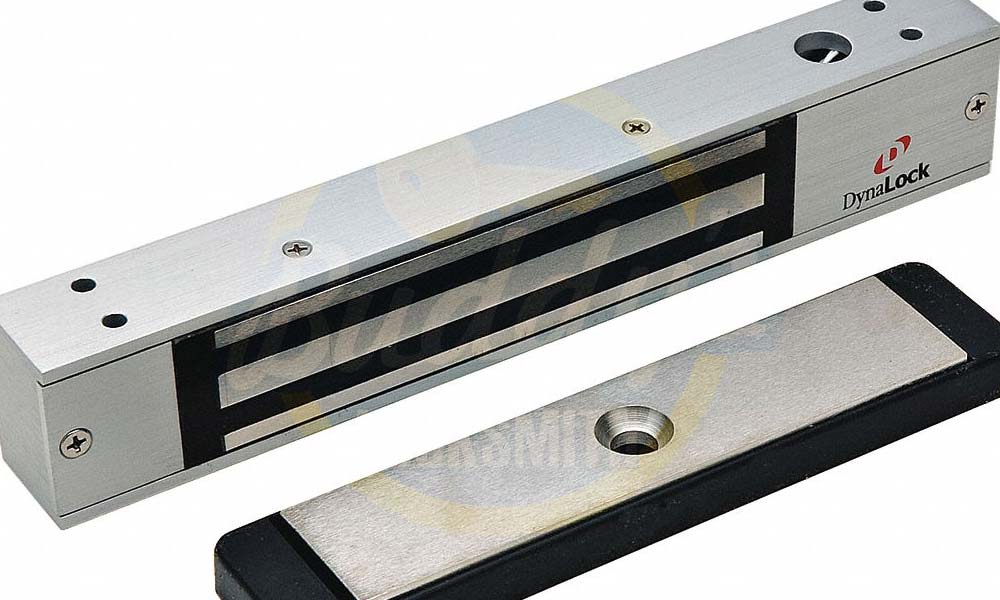
Commercial Door Smart Locks
These commercial smart locks can be unlocked without a key and are considered “smart locks.”.They are powered by electricity, and some are internet-enabled. They usually come equipped with a keyhole, just in case. And there are three types of keyless locks: keypad, key card, and biometric.
You’re probably familiar with keypads and key cards. Biometric locks are much less familiar. These locks scan a fingerprint or even a face to unlock the door, but they raise privacy concerns with some.
One keyless lock we haven’t explored here is the smart lock, part of the Internet of Things (IoT). These locks have sensors and processing ability and can connect and exchange data with other devices. Let’s take a look.
IoT Smart Locks for Commercial Doors Bring the Future Today
This type of smart lock can be managed from anywhere, integrated with video surveillance, share access automatically, and provide detailed analytics. Smart they are, and they are compatible with smartphones, smart assistants, and smart business management systems such as those that turn on and off lights automatically at set times and adjust your thermostat.
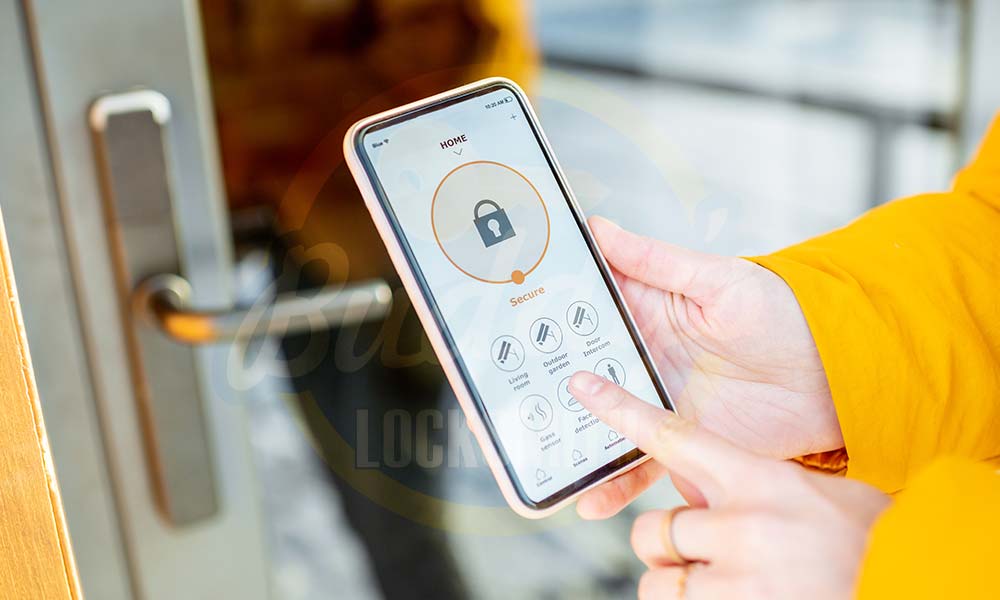
This lock can even trigger your security system to send you a video if someone unlocks the door outside of business hours. It offers benefits like:
- You can check on door status remotely to make sure the door is locked no matter where you physically are anywhere in the world.
- You can give and take away access to employees or visitors, allow some to access at specific timers only, or offer unlimited access to those you particularly trust.
- You get instant notifications when the door is opened, so you’re aware of unexpected and unauthorized entry.
Features of the Best Smart Locks
Traditional door locks are becoming a thing of the past, and electronic locks are becoming more popular each day. Choosing the right Commercial storefront door lock is vital because all smart locks aren’t created equal. There are important features to look for when selecting the best smart lock for your storefront business. When choosing a lock, your focus should be on performance as well as making security easier. Here’s what you should pay attention to:
The right security features for a commercial storefront door
Locks are for security–to ensure only those authorized have access. Look for a business door lock that is resistant to forced entry, and pick one with an ANSI Grade 1 deadbolt. But physical security isn’t the only thing you need to pay attention to. Cybersecurity is vitally important.
Because this type of lock is used with smartphones, tablets, and other smart devices, it can suffer a hacking attack. Make sure your lock has the right authentication protocols and secure automation. At Buddy’s Locksmith, we can serve as your guide to cybersecurity and your smart lock.
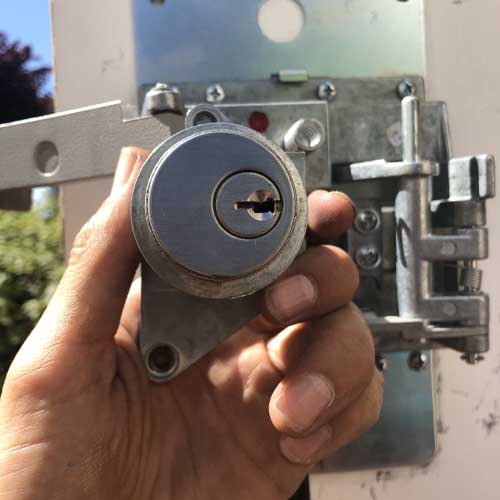
Battery life
Traditional locks need no power to operate, unlike smart locks, which rely on a steady power source to function. All smart locks have batteries but look for one that has a long battery life and has built-in power conservation.
Virtual connectivity
Being connected with your smart lock no matter where you are is an important function. It gives you the power to know the current state of your smart lock in all cases. You can lock or unlock your business door from far away, get notified that your door is unlocked and if unauthorized entry has been made. It can also track authorized users who entered the building.
Software connectivity
The best smart locks come with apps for your smartphone or tablet, which makes these locks really easy to use. The accompanying apps will be how you get the information this connected device gathers and gives you and many businesses complete control in the palm of your hand.
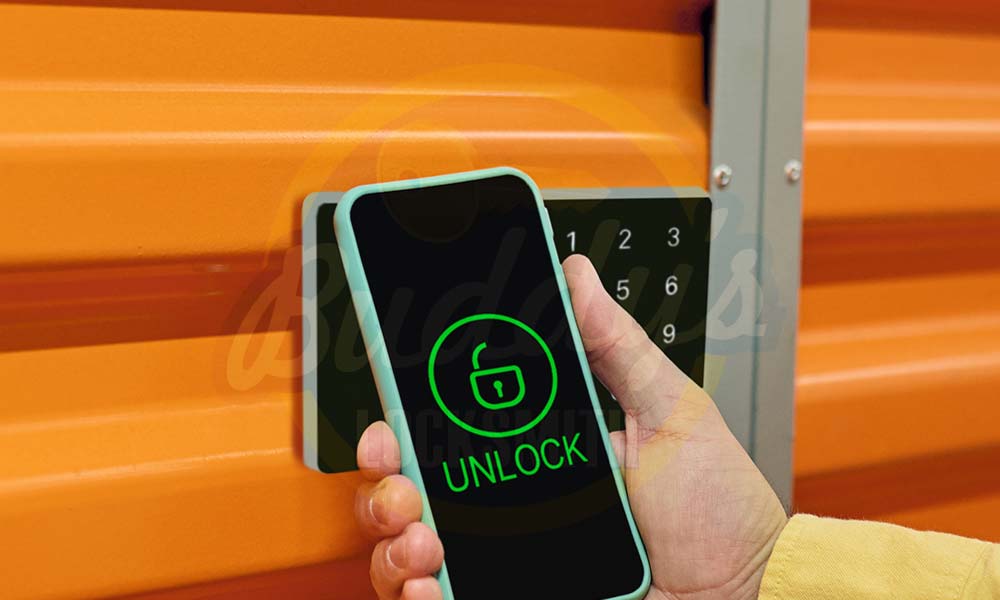
Electronic keys
Electronic keys mean you can generate temporary keys for employees and others, such as repair people, for a period you determine. Revocation is easy through the mobile app or online, and there’s no awkward conversation about returning keys because there are none!
Integration ability
Choose a smart lock that can integrate with other smart devices and technology in your business. You want a lock that can work with your security system as well as any doorbell or video entry technology you use.
The Average Cost of a Smart Lock System
The cost of any type of door lock system varies. To put the cost of a smart lock system in context, we have to look at how much other systems cost.
Manual key systems are your least expensive option and provide the least security and no smart functionality. Physical keys can cost between a couple of dollars and $70, depending on whether there’s any embedded coding. Initial installation costs between $150 and $300.
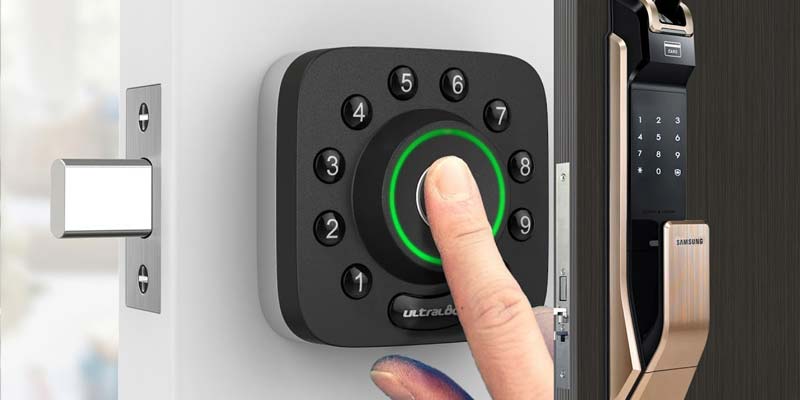
Key card and key fob systems mean everyone has to have a card or key fob, which means if any are lost or stolen, they have to be replaced at a cost of up to $10 per card and $50 per fob. Total installation cost per door ranges from $1,500 to $2,500.
Keypad locks save money in terms of not having to replace keys, cards, or fobs. Security falls down a bit in that each user doesn’t need an individual credential. Including adjustments, installation, and maintenance, you’re looking at between $400 to $1,500 per door.
Biometric locks. These are a great way to control access, but they cost more than $2,000 per door, and then there are the privacy issues.
Commercial Smart door locks are the cream of the crop, with the most flexibility. The average cost for an IoT smart lock system sits between $600 and $1,200 per door, including hardware, installation, and app or online configuration.
The Best Advice on Commercial Locks Comes from An Experienced Locksmith
For more than 10 years in the San Jose area and beyond, businesses have been counting on Buddy’s Locksmith to recommend and properly install the perfect lock to keep your storefront secure. We have any type of lock you can imagine and install only Grade 1 brands such as Schlage, Mul-T-Lock, and Assa Abloy.
Our San Jose locksmiths are licensed, bonded, and insured for your safety and peace of mind. And we offer help with commercial lockouts. We offer the best price guarantee, and we have hundreds of five-star reviews. We’re also top-rated by HomeAdvisor and Yelp, and you can schedule a commercial door repair through your mobile device.
Give us a call at (408) 315-2063 if you need mortise locks for your storefront doors or if you’d like to upgrade your office smart lock!

